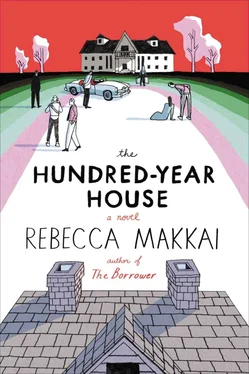“He’ll take you for Amelia Earhart’s younger brother. Tell me,” he said, “now we’re alone, about Eddie Parfitt.”
“He’s tremendously talented. Vachel Lindsay wrote his reference.”
“I mean — he’s been here two weeks. I’m late to the game. Is he, you know, my sort of gentleman ?”
“Oh. Yes, I imagine. Ask Marlon. He’d know.”
Armand laughed. “If Marlon knows, I’m far too late.”
“He could use some bringing out of his shell, at any rate. I’ll put you in charge of it. Only don’t fall in love with him.”
Armand looked hurt, as if she’d misread him completely. But she knew him better than he thought. It was only his first visit, but Armand had been her friend for years, since the days when he was sleeping on the floor of someone’s studio in the Fine Arts Building. He’d been so young. Well, so had she. Later, when he finally had a bit of money, he’d bought her blue ladder painting. They’d worked together on the No-Jury show. And she knew, if nothing else, that he was quite similar to her. He believed that drawing the world would keep him at an ironic distance from it, keep him safe from caring deeply about things. When in fact it had the opposite effect. And she knew how Laurelfield had affected her , on her first stay — as an artist, long before she dug in her nails and managed to get hired. She’d felt exhilarated and confused, and she couldn’t eat, and she couldn’t sleep, and she mistook it all as love for an older poet, a man with a pipe and a wife. She’d thrown herself at him, and they were together awhile, until — later, back in the city — she realized she had no interest in the man at all. What she’d been in love with was Laurelfield, and everyone there, and her own work, and maybe even with herself , for the first time.
She saw that same wild look in Armand’s eyes. He was looking for someone to love. He was a transitive verb with no direct object.
She said, “Just watch your heart.”
Down at the bottom of the stairs, Alfie started barking. He ran all the way up and then all the way down, and Samantha followed him.
A woman struggled at the door, propping it open with her foot and hefting a wet valise through the frame. Behind her, a man unloaded trunks from a taxi straight into a puddle. The screenwriter wasn’t due to arrive till tomorrow, but this was obviously her. She bore that distinct look of the arriving artist: disoriented, exhausted, profoundly relieved to be there. “I’ve arrived too early!” the woman said, only she said “arrifed,” her voice thick with dignified German. Samantha scrambled to remember the name — Marcelina von Hornig, there it was, and she’d wondered if it would be a “Marcy” type or a “Lina,” but clearly this woman was above shortening — and then, as the door closed behind her and Alfie was subdued and the woman looked up into Samantha’s face, Samantha reeled. This was Marceline Horn , the film star Marceline Horn, in color, in three dimensions. The same high-bridged nose, the enormous eyes, eyelashes like window valances. She’d played Juliet and Charlotte Corday. She’d kissed Valentino. Samantha had gotten used, over the years, to speaking with artists and writers whose talent intimidated her. This was different, though, more like meeting Cinderella than the Brothers Grimm.
Samantha managed to say, “It’s not a problem. The maid was already making up the room for you. You might have to work in the — in the library. Until it’s done.”
“Oh, of course . I need a few hours to screw my head back on.”
“You’ve had a long trip.”
“Vell, I vas in Chicago a veek.”
“Yes.” The address on this woman’s papers — Beverly Hills, California — hadn’t seemed odd, since she was coming to write two movie scripts. A letter of recommendation from L. B. Mayer, himself, of MGM. Samantha had convinced the rest of the file readers that this would be a novelty, that they’d be embracing a new form of storytelling. Mayer’s letter said he’d worked with the woman in the past, but it said nothing of directing her in films, of their affair — wasn’t there an affair? She remembered something, an item in Picture Play —just that she showed great talent and needed a quiet place. And for all Samantha could tell from the script sample, she was a natural writer.
Stupidly, her lips numb: “This is Alfie. A wirehaired pointing griffon. He’s harmless.”
Marceline bent to look him in the eye. “I’m a great friend of the dogs.”
Samantha took in the woman’s outfit: the green cloche hat, the slim black frock with pearls at the hip — all regular enough, if a bit formal for mid-morning — but below that, and above her black one-straps, she wore silk stockings appliquéd with green velvet snakes that appeared to climb her legs.
Behind her, Armand crouched on the landing, peering down. He was silent — which, Samantha knew, was his particular form of shrieking. Beatrice stood behind him, her fingers to her little chin.
“Armand,” Samantha said, and he didn’t answer. “Will you be a dear and see if Maisie has finished the yellow room? And the kitchen needs to know, as well, that there will be one more for dinner. You could help with the trunks. And Beatrice, the packet. For Miss von Hornig.”
Beatrice vanished. Armand rushed past them both and out the door with no umbrella. It occurred to her that Armand might bang on everyone’s door with the news before he bothered finding Maisie, that eight noses might be pressed to the wet window within minutes, but meanwhile she had her list of things to say, her regular and memorized orientation to Laurelfield — the quiet hours, and keys, and meals — and this woman looked as thirsty and tired as any new arrival. She invited Marceline to follow her up to the kitchen. She dropped the folded telegram into the dustbin and put the kettle on for tea.
Marceline stopped her, as she crossed the kitchen, and clasped one of Samantha’s hands in her soft, strangely large ones. “I tell you, I feel like Shakespeare’s Viola, vashed up on the shore of Illyria. And I can tell this is a blessed place. A generous place. I feel it in my feet.”
“You haven’t even seen it all yet!”
“It is not something von sees .”
LUDO AND JOSEPHINE ON THE LAWN
They look at the roof, the way the sun just now, at eleven, shoots a tentative ray over the top, the last rain turning to mist. In a minute, it will be too bright to look east.
Ludo says, “No, I don’t believe. Back in Napoli, one time, I go to a séance. Is all tricks. All click-click and knocking sound and guess what someone wants to hear.” He laughs. “Is same with my music, no? Knock knock, tell you what you want to hear. I used to write symphonies. Now I make rhymings and bouncings.”
“No ghost appeared? At the séance?”
“The ghost is in our ears.”
“Marlon swears he heard something in the night.”
“I tell you what I learn: At a colony, there always come noises in the night. Howling, thumping, door slam, moaning, bang bang bang, you know. You know what is? Is not ghosts.”
“What?”
“Is people making sex.”
UPDATED 29 AUG ‘29
Abbaticchio, Ludo (M)
Composer
*
St: Comp. Cottage
R: Southwest
*
Cadfael, Fannie (F)
Sculptor
Cleveland Hts, Ohio
St: Solarium
R: Blue
through 9/2
Cox, Armand (M)
Illustrator
Chicago
St/R: Longhouse E
through 10/4
Lizer, Josephine (F)
Sculptor
Cleveland Hts, Ohio
St: Solarium
R: Green
Читать дальше












